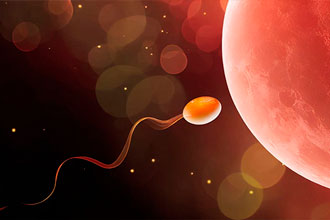The Beginning of a New Life

Motherhood goes beyond the tangible and intensifies the deepest emotions. Being a mother cannot be explained, you are, you feel and you live.
For a long time, motherhood has been linked to the belief in natural instinct, since it is a situation that we share with other mammals and can create an experience of connection and attachment, the decision and exercise of motherhood, each woman lives it differently. different ways. Some of us opt for this alternative as if it were the most natural path of our lives, others choose to do it if we consider that it is consistent with our life project, some more have decided not to be mothers. It is important to stop associating motherhood as a mandate or a variable that defines and conditions the value of women. On the contrary, bringing girls or boys into this world is a conscious personal decision that will make for happier generations and a better society.
For me, motherhood is empowerment, it is courage, it is love, it is doubting, it is laughing, it is crying, it is feeling alone or misunderstood, it is a revolution of all emotions, it is a phenomenon that marks us for our entire lives, but one chooses how to live it So far there is no recipe or universal way to be the perfect mother, each woman is a mother in her own way, because it is innate. The experience from pregnancy to childbirth is an experience of delicate emotional situations or the possible appearance of a more complex disorder, such as depression, anxiety or psychosis.
Let's stop romanticizing motherhood, since many times it is not as rosy or as perfect as we have heard socially, since an erroneous idealization of motherhood has been made, however, various physical, psychological, nutritional, medical and emotional changes are experienced , which the more we have the freedom to expose and talk about it, the more bearable it will be for each of us.
What changes occur in the first trimester of pregnancy?
In this period, the absence of menstruation is presented as a sign of conception, it is one of the first signs and one of the most evident. In the first weeks there may also be slight bleeding due to the implantation of the embryo, although there are some women who are still menstruating while pregnant.
There is also an increase in the size and sensitivity of the breasts, the nipples become more prominent and the areolas become larger and darker. Likewise, small whitish bumps around the nipple, called Montgomery tubercles, swell and become visible, which will later be in charge of producing a liquid that will help protect it. Occasionally, the development of the breast can cause twinges and pain in the nipples.
In addition, with the increase in the size of the uterus, its walls are strengthened, while the blood vessels dilate and the blood volume increases from four to five liters, in order to adequately nourish the embryo. At 12 weeks pregnant, a slight bulge can be seen in the abdomen. After 20 weeks, the growth of the uterus reaches the level of the navel and the bulge of the abdomen becomes more evident.
On the other hand, the heart beats faster because it has to pump more blood and the placenta receives one fifth of the mother's blood flow. The amount of blood in the mother also increases, and the breathing rate and metabolism become faster. The blood return through the veins, from the legs, can be more affected by the increase in the size of the uterus and swelling or edema can occur in the legs and, sometimes, varicose veins.
In these first months the appetite becomes greater, so weight gain is inevitable, although it also depends on the organism that each woman has since it is possible that some women tend to lose a little weight. The waist can widen and, from the second month, the hips can too.
As I mentioned before, not everything is rosy, many women suffer consequences of hormonal changes, flavors can be perceived differently. Smell is also more sensitive than usual, which can lead to an exaggerated perception of some odors, leading to nausea. Likewise, the appearance of various discomforts. For example, the mother may suffer from swollen gums, nausea and vomiting (especially in the morning), heartburn, discomfort, tiredness, constipation, hemorrhoids, the need to sleep more hours or pelvic pain, etc. The frequency and intensity of these symptoms differ from one mother to another.
Changes in the skin increase the activity of melanocytes (skin cells that contain a pigment called melanin). This causes the appearance of a dark line between the pubis and the navel and the darkening of the nipples and areolas.
It is very important that at the beginning of the pregnancy a gynecological control begins, so that you perform the first ultrasound and the clinical analyzes, (urine, blood group and RH factor, HIV, Syphilis, Hepatitis B and C) this with the purpose to prevent complications during pregnancy.
What changes occur in the second quarter?
From weeks 13, the second trimester begins, the mother's body will continue to transform to facilitate the development and growth of the fetus. The uterus and, therefore, the abdomen, continue to increase in volume. Consequently, the waist continues to widen. This can cause pinkish stretch marks on the skin, it is essential to keep the skin hydrated, especially the belly, to avoid the appearance of stretch marks.
During the 16 weeks of gestation, you may start to feel the small movements of your baby. If you or your partner put your hand on your belly, you will feel the movements. Wonderful! Your baby grows and develops at a dizzying and amazing rate.
The kidneys and the heart work even more intensely, the blood volume has increased by 50%. There may be a greater feeling of swollen legs or tiredness, urination more frequently due to pressure on the bladder.
The intestinal rhythm slows down, which can cause heavy digestion, heartburn, flatulence and constipation.
The gums also become more sensitive and can bleed, so it is recommended to visit the dentist 4 times during pregnancy.
Many of the discomforts that may have appeared during the first trimester, such as nausea or tiredness, disappear during these weeks and, in fact, it is common for the mother to feel full of energy.
It is worth remembering that during weeks 20 and 24, morphological or structural ultrasound should be performed, since it allows us to verify possible malformations and alterations, the growth of the fetus and the development of its organs are assessed.
What changes occur in the third trimester of pregnancy?
During these weeks, the pregnant woman will experience the following physical changes:
The increase in size of the uterus and abdomen continue. They can even interfere with the daily routine of the pregnant woman in activities as basic as eating, sleeping, walking, bending over or sitting up. Keep increasing the weight.
There is the presence of intermittent fatigue, which causes a greater need to sleep more frequently.
In the last weeks of gestation, the breasts can produce a yellowish or white fluid called colostrum that contains a large amount of minerals and antibodies. It is a normal liquid that will be the baby's first food during breastfeeding.
It is common to increase the desire to urinate, when the baby's head is already embedded in the pelvis. There are some discomforts such as heartburn, back pain or pelvis pain, it is often recommended to use maternity girdles as support to give support to your hip.
What psychological changes occur during pregnancy?
The physiological transformations of pregnancy are usually accompanied by different emotions, which occur throughout pregnancy:
In the first few months, it is normal for a woman to experience mood swings and often feel irritated for no apparent reason. This is due to both the hormonal changes typical of this stage, which increase a woman's sensitivity, and concerns regarding the evolution of the pregnancy and the health of her baby, which usually arise during the first trimester. It is important to express these emotions and ask the questions that generate them. So it is essential to have a therapeutic accompaniment to prevent disorders of depression, anxiety or even psychosis.
The second trimester is generally a quieter time. It is in this period when most of the questions have already been answered and the baby is already a fetus, it is not forming, but growing. The baby's movements are noticeable and many symptoms such as nausea or vomiting disappear. They are moments of connection between mother and child.
Many of the women in this stage experience negative emotions such as fear or anxiety since the proximity of the birth can rekindle concerns and fears for the health of the baby and for the ability to care for it properly, while the pregnant woman begins to feel more impatient for meeting him. It is important to voice these concerns and ask as much as necessary. At this time, the talks and childbirth preparation courses are very useful.
Sometimes a depressed mood can also occur in pregnant women. However, the above feelings depend on factors such as the mother's personality and the circumstances of her pregnancy.
Finally, changes in the body can lead to lower self-esteem, especially in the third trimester, since you don't feel as attractive as before or you are afraid of not being the same after giving birth. All of this, again, can intensify sadness and worry.
Positive emotions such as joy, pride and illusion are also experienced. They are frequent from the moment the pregnancy is known, it all depends on the context or situation in which you find yourself, do not forget to seek support if you need it.
It is a fact that once you are a mother, you will never be the same again. Beyond the changes and marks on your body, there is also a change in your way of thinking and seeing life.
Motherhood comes to revolutionize your world, makes it more beautiful, but also much more chaotic. Motherhood comes to confront your own beliefs, your own fears, your own "I WOULD NEVER DO". Motherhood brings out the best and the worst in you, because it takes you to the extreme, physically and emotionally. Motherhood comes to teach you that, no matter how much you want, you will not always be in control of everything. Motherhood comes to paint your life with colors and often makes you confront yourself.
Although it is true, there will be gray days, where you do not know where to start and exhaustion consumes you, but there will also be other days where you feel proud of everything you have achieved, other days when you do not want to get out of bed and It is valid to take the time, likewise, there will be days when you will be the most efficient and organized. It is a fact, once you are a mother, you will never be the same again. You become a better version of yourself, you get tired, you fall and you get up again.
“REMEMBER YOU ARE DOING VERY WELL, YOU ARE DOING WONDERFULLY, AT YOUR TIME AND AT YOUR RHYTHM”
Text by: Gloria Flores Reyes
Recovered in: Cinfasalud
Images: pxhere.com & pixabay.com
Within our babysitting services, we care about the health and development of your little one, which is why every day we prepare to offer a quality service: always taking a humane and professional approach hand in hand.
- Details
- Hits: 677
© Nanny Heart 2022 - Website design MGF Creative Solutions. - Políticas de cookies y privacidad


